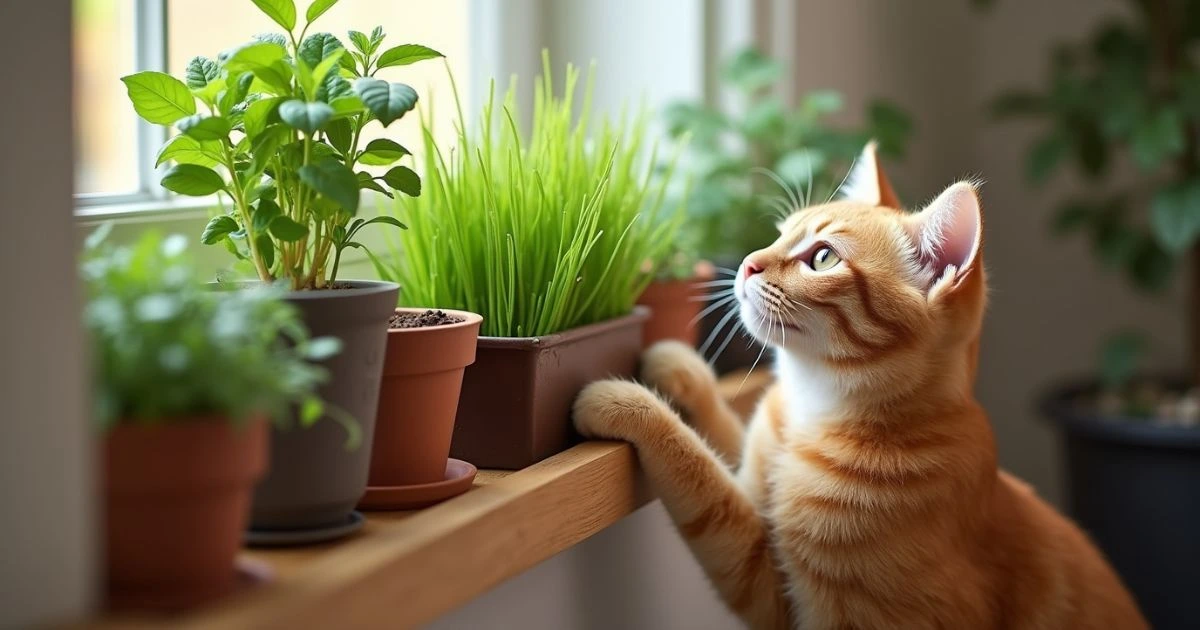Creating an indoor herb garden can be a delightful way to bring fresh greenery and flavor into your home. But if you’re a cat owner, you know how curious your feline friend can be, especially when it comes to plants. Understanding how to manage an indoor herb garden and cats safely is key to ensuring your plants thrive while keeping your pet safe. Let’s dive into seven essential tips to help you maintain harmony between your herb garden and your furry companion.
Table of Contents
Why an Indoor Herb Garden Matters for Cat Owners
An indoor herb garden is more than just a decorative addition to your home. It provides fresh ingredients for your cooking, boosts air quality, and enhances your indoor environment. But cats, being naturally curious creatures, often see your lush herbs as a playground or snack. This can pose challenges, especially when some herbs are toxic to cats.
Benefits of an Indoor Herb Garden
- Fresh, homegrown herbs elevate your culinary creations.
- Indoor greenery promotes a calming and inviting atmosphere.
- Plants like basil and cilantro are safe for cats, adding to the appeal.
Challenges of Indoor Herb Gardens with Cats
- Cats may chew on your plants, potentially damaging them.
- Some herbs are poisonous to cats and can pose health risks.
- Finding the right balance between vibrant plants and a pet-safe environment can be challenging.
Herbs for Cats: What’s Safe and What’s Not
Understanding which herbs are safe for your cat and which are toxic is crucial when planning your garden.
Cat-Friendly Herbs
- Basil: This herb is safe for cats and adds flavor to your dishes. If you’re asking, “Is basil harmful to cats?“ – the answer is no; it’s completely safe.
- Cilantro: A non-toxic option that’s great for both you and your feline friend. Asking “Is cilantro toxic to cats?” should give you peace of mind knowing it’s not.
- Parsley: Packed with vitamins, parsley is safe for cats in moderation.
- Catnip: Stimulates your cat and keeps them entertained.
- Dill: A safe herb with a mild, pleasant scent that cats can explore.
Herbs Poisonous to Cats
- Oregano: Can upset your cat’s stomach.
- Garlic: Extremely toxic, potentially causing anemia.
- Chives: Harmful to cats, leading to digestive distress.
- Certain Mint Varieties: Pennyroyal mint is especially dangerous.
Table: Toxic Herbs vs. Safe Herbs for Cats
| Toxic Herbs | Safe Alternatives |
| Oregano | Basil |
| Garlic | Cilantro |
| Chives | Dill |
| Pennyroyal Mint | Parsley |
7 Tips to Keep Your Indoor Herb Garden and Cats Safe
1. Choose Cat-Friendly Herbs
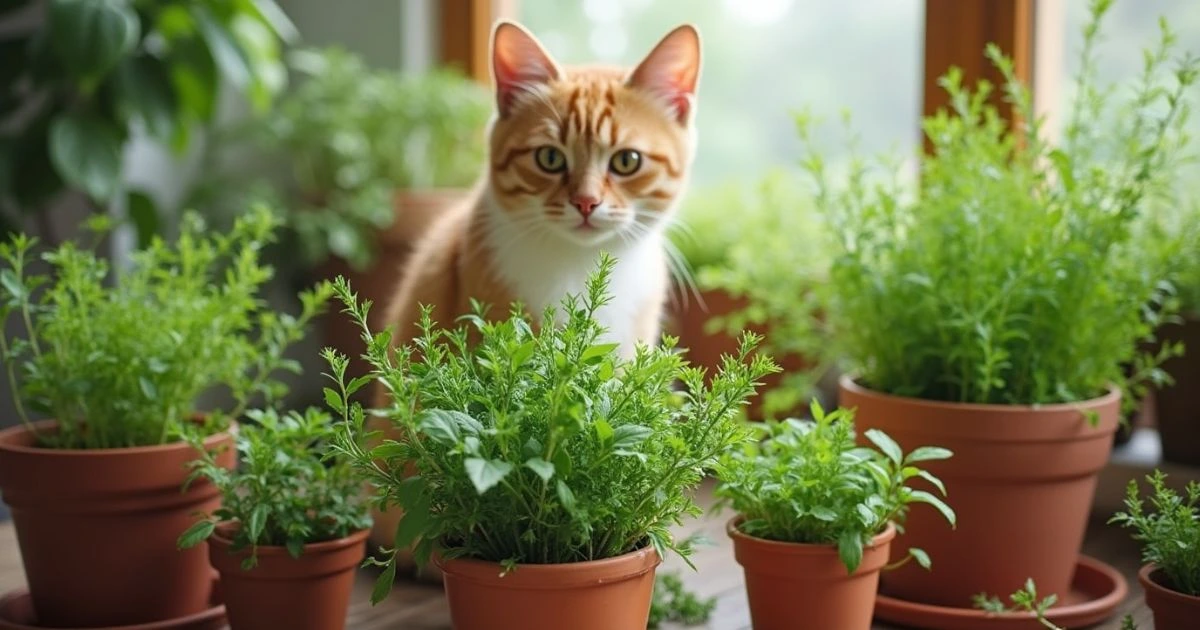
When setting up your indoor herb garden, prioritize cat-friendly herbs. Herbs like basil, cilantro, parsley, and dill are not only safe for cats but also practical for cooking. If you’re wondering, “Is basil toxic to cats?” or “Is cilantro toxic to cats?” the answer is reassuringly no. Avoid herbs poisonous to cats, such as oregano and garlic, to prevent potential health risks for your feline friend.
2. Use Elevated Planters
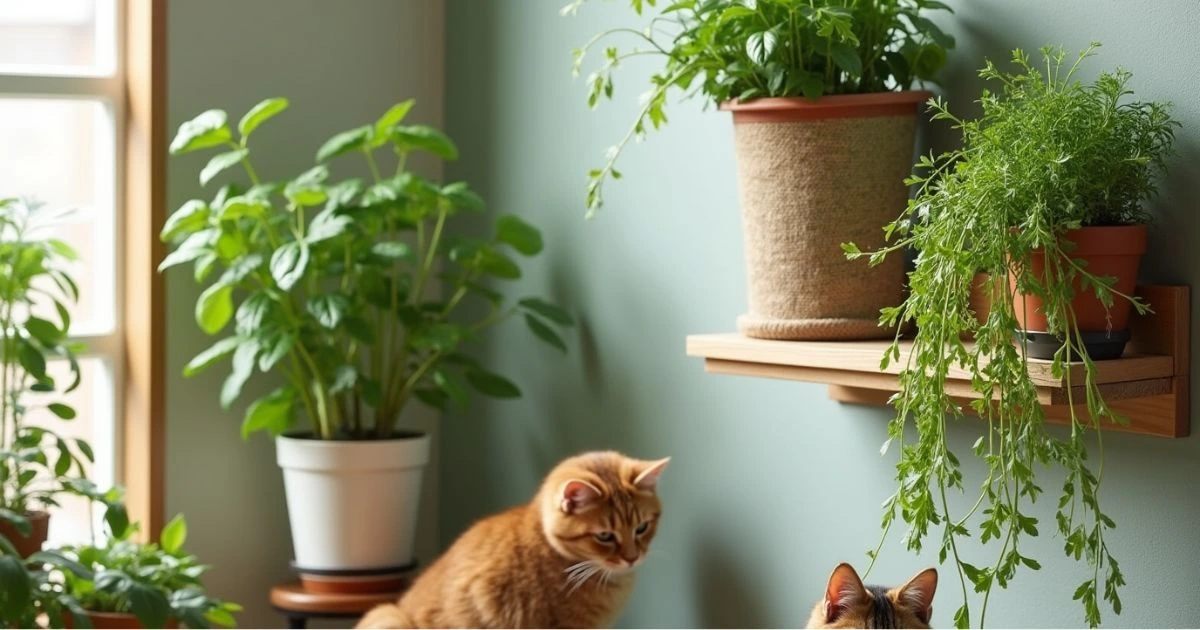
Keep your herbs out of your cat’s reach by using elevated planters, wall-mounted shelves, or hanging baskets. Not only do these methods protect your indoor herb garden from curious cats, but they also create a visually appealing setup. Ensure the plants receive adequate sunlight to thrive while staying safely out of reach.
3. Create a Dedicated Cat Herb Garden
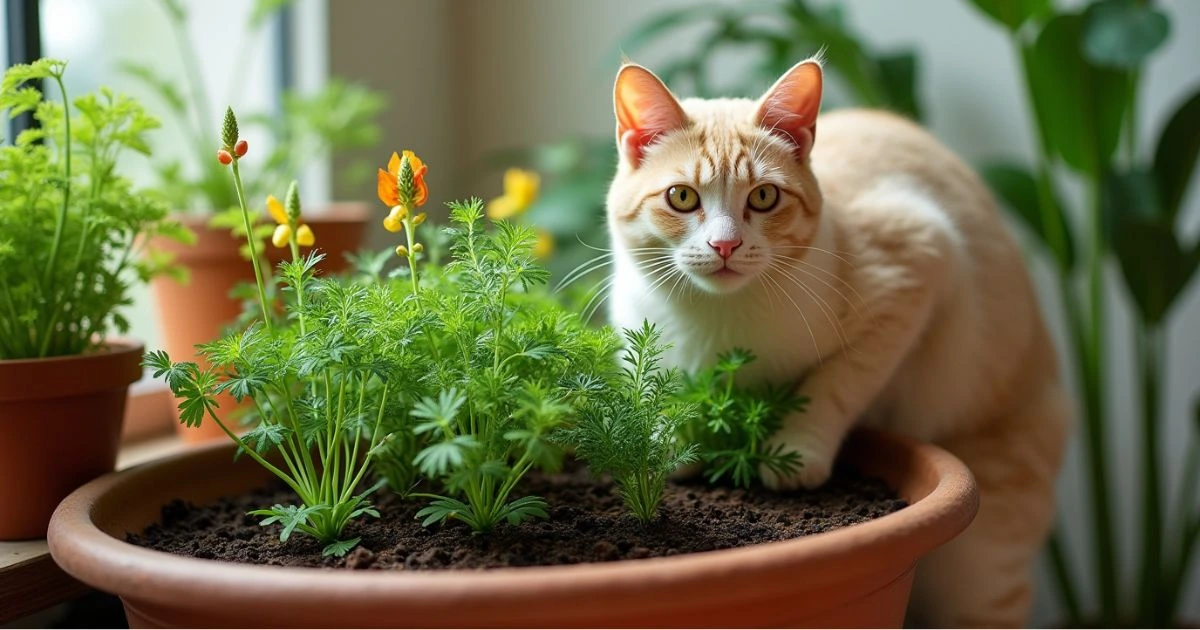
Satisfy your cat’s natural curiosity by creating a small herb garden just for them. Include safe herbs like catnip, dill, and parsley. This will divert their attention from your main indoor herb garden. A cat-friendly herb garden can keep your feline entertained while protecting the rest of your plants.
4. Use Physical Barriers
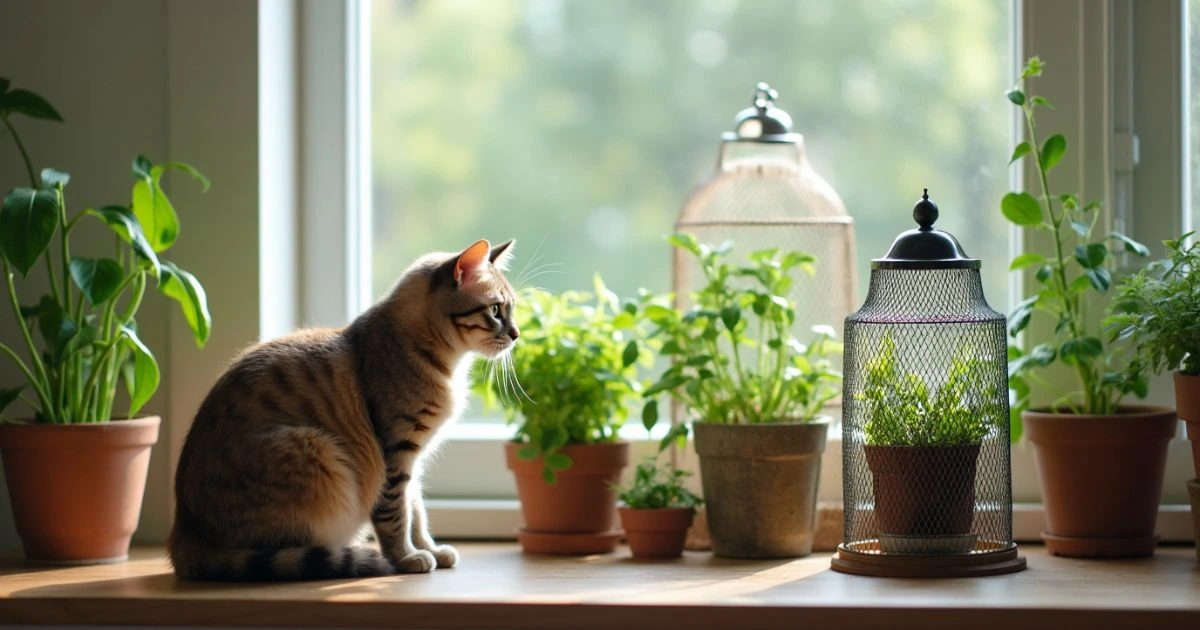
Physical barriers can help keep your cats away from herbs poisonous to cats. Consider using mesh covers, decorative cloches, or terrariums to protect vulnerable plants. Another effective method is to place deterrents like double-sided tape or aluminum foil around planters to discourage your cat from exploring your indoor herb garden.
5. Incorporate Cat Deterrents
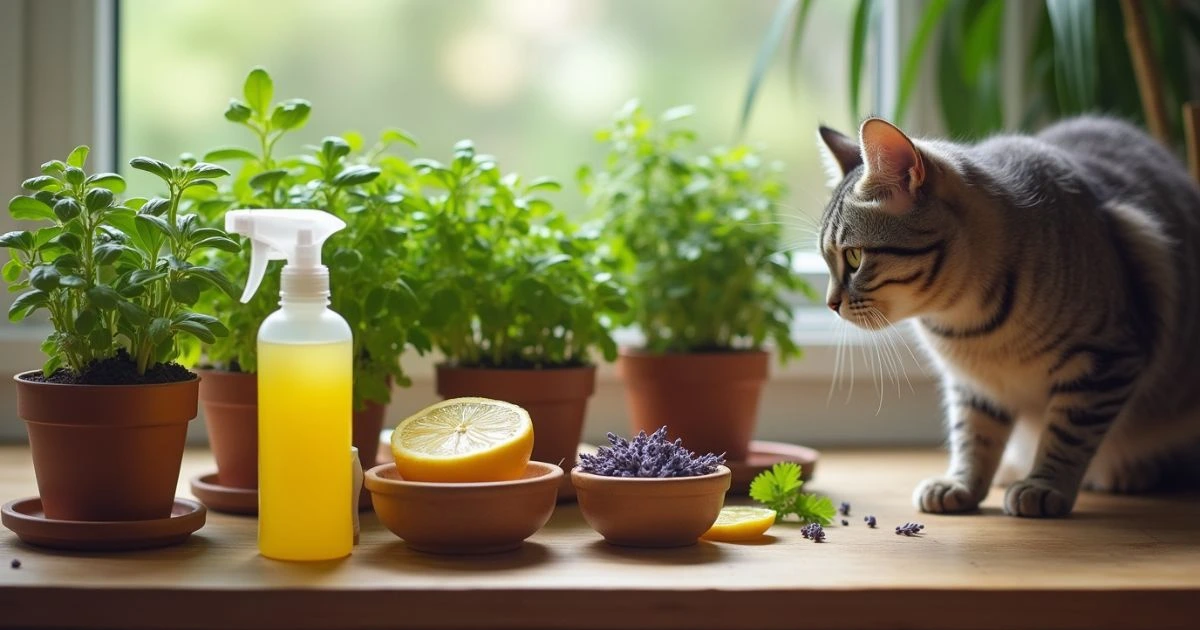
Cats dislike certain scents, such as citrus, vinegar, and lavender. Use these natural deterrents around your herb garden to keep your feline at bay. For example, a DIY citrus spray made with lemon juice and water can be applied around the planters (but not directly on the herbs) to create an invisible boundary.
6. Train Your Cat to Avoid the Garden
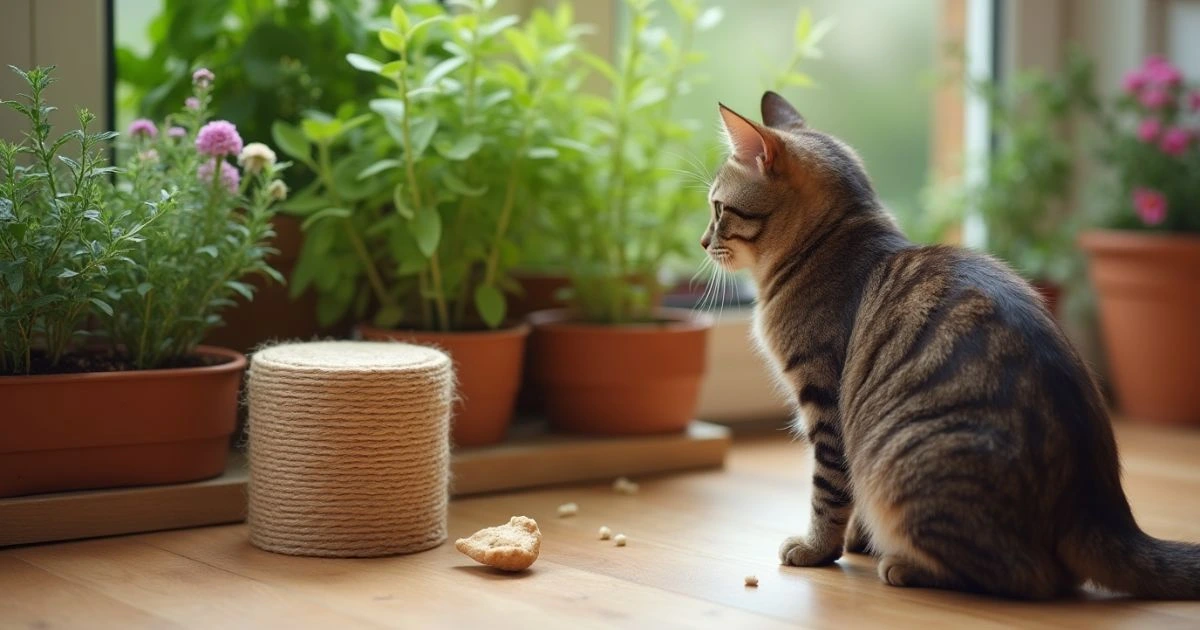
Training your cat is an effective long-term solution. Use positive reinforcement to reward your cat when they stay away from your indoor herb garden. Provide toys, scratching posts, or a dedicated play area to keep them occupied. Consistent training helps create boundaries and ensures your cat learns to coexist with your indoor herb garden.
7. Monitor and Maintain Your Garden Regularly
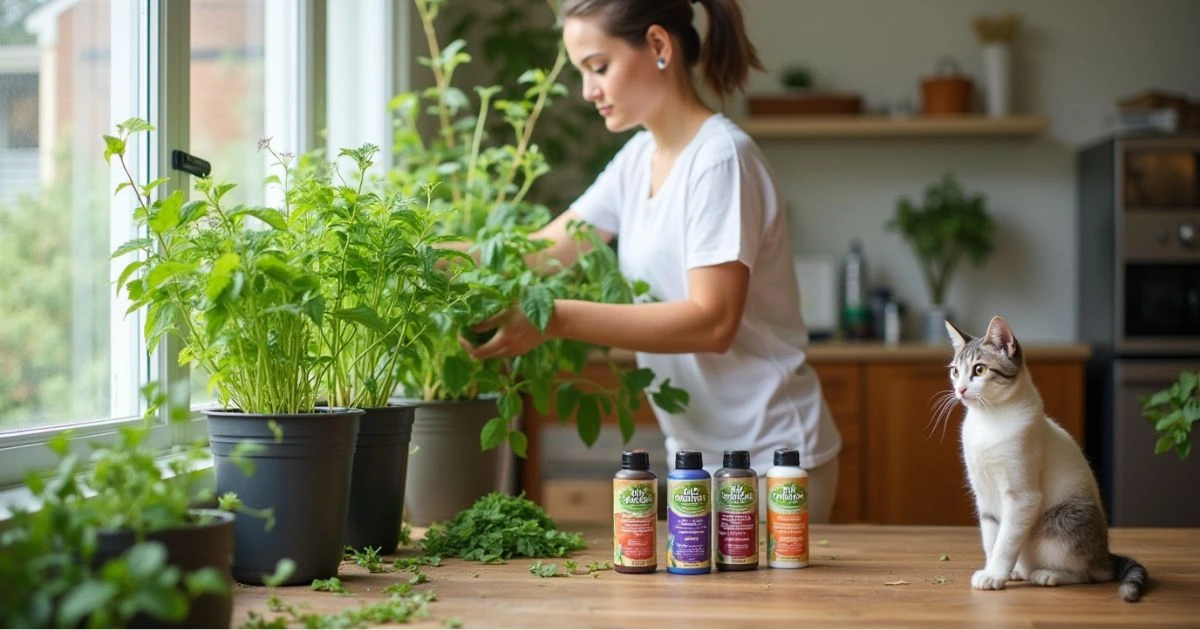
Routine maintenance is essential to keep your herb garden safe for cats. Prune your herbs regularly to remove any dead or wilted leaves that might attract your pet. Always clean up fallen leaves, especially if you have herbs poisonous to cats, to prevent accidental ingestion. Additionally, ensure your herbs are free from toxic fertilizers by using organic, pet-safe options.
Selecting the Ideal Spot for Your Indoor Herb Garden
Elevate and Secure Your Plants
- Use shelves, wall-mounted planters, or hanging baskets to keep your herbs out of reach.
- Ensure your plants are near natural light sources to thrive, such as sunny windows.
Create a Cat-Safe Zone
- Dedicate a corner of your home to safe herbs for cats like catnip and parsley.
- Use toys and scratching posts near your garden to distract your feline friend.
Use Physical Barriers
- Protect plants with mesh covers, decorative cloches, or terrariums.
- Place deterrents like aluminum foil or double-sided tape around planters to discourage cats from approaching.
Training Your Cat to Stay Away from the Herb Garden
Positive Reinforcement
- Reward your cat when they stay away from your plants.
- Provide alternatives like a cat herb garden or toys to keep them occupied.
Natural Cat Deterrents
- Use scents like citrus or vinegar to keep your cat away. Cats generally dislike these smells.
- Spray a DIY citrus solution around your herbs (avoid spraying directly on the plants):
DIY Citrus Spray Recipe
| Ingredient | Quantity |
| Lemon juice | 1 tbsp |
| Water | 1 cup |
| Spray bottle | 1 |
Creative Herb Garden Designs for Cat Owners
Vertical Gardens
- Use wall-mounted planters or tiered shelves to maximize space and keep herbs away from cats.
- These designs not only protect your plants but also add a modern touch to your home decor.
DIY Cat Herb Garden
- Create a separate garden for your cat with safe herbs like catnip, dill, and parsley.
- Place this garden at ground level to satisfy your cat’s curiosity while protecting your main herb garden.
Hanging Baskets
- Hang baskets from the ceiling to utilize vertical space and keep herbs out of reach.
- Use sturdy hooks and ensure the baskets are securely fastened.
Caring for Your Herbs While Managing Cats
Proper Watering
- Overwatering can lead to mold, which might attract cats. Use saucers to catch excess water.
Organic Fertilizers
- Opt for pet-safe fertilizers to ensure your herbs remain non-toxic.
- Regularly rinse herbs to remove any residue before use.
Routine Maintenance
- Prune your herbs to encourage growth and remove wilted leaves promptly.
- Clean up fallen leaves to prevent your cat from ingesting them.
What to do if your cat consumes a toxic herb.
Recognizing Symptoms
- Vomiting
- Diarrhea
- Lethargy
- Excessive drooling
Immediate Action
- Remove the plant from your cat’s environment.
- Reach out to your veterinarian or an animal poison control center for guidance.
- Provide details about the herb to assist the vet in determining the best course of action.
Herbs That Repel Cats
Some herbs are naturally disliked by cats and can serve as deterrents:
- Rosemary: Cats are often put off by its strong scent.
- Lavender: While calming for humans, it deters cats due to its intensity.
- Rue: A lesser-known herb with a pungent aroma that cats avoid.
Incorporate these herbs around your indoor herb garden to create a natural barrier, ensuring both your plants and cats stay safe.
Incorporating Your Herb Garden Into Your Home’s Aesthetic
Decorative Planters
- Choose stylish planters that blend seamlessly with your home decor.
- Use color-coded pots to differentiate between safe herbs for cats and those you want to keep off-limits.
Kitchen Integration
- Grow frequently used herbs like basil and cilantro on your kitchen counter.
- This ensures easy access while keeping them away from curious cats.
Educational Opportunities and Community Sharing
- Teach children about the importance of herbs and how to care for them safely around pets.
- Share your gardening experiences with friends who own cats, offering tips for creating their own safe indoor herb gardens.
- Join online forums or social media groups dedicated to herb gardening and cats to exchange ideas and solutions.
FAQs About Indoor Herb Garden and Cats
- Can basil and cilantro be grown safely with cats?
Yes, basil and cilantro are non-toxic to cats and can be part of your indoor herb garden. - Is basil toxic to cats if they chew on it?
No, basil is safe for cats, even if they occasionally nibble on it. - Is cilantro toxic to cats?
No, cilantro is not toxic and is perfectly safe for cats. - Which herbs are poisonous to cats?
Toxic herbs include oregano, garlic, chives, and pennyroyal mint. - Can I use fertilizers in my herb garden if I have cats?
Yes, but ensure you use organic, pet-safe fertilizers. - How can I stop my cat from eating herbs?
Use deterrents like citrus spray, elevate your herbs, or create a cat-friendly herb garden. - Are there herbs that repel cats?
Yes, rosemary and lavender are known to repel cats due to their strong scents. - Can I grow catnip in the same garden as cooking herbs?
Yes, catnip is safe and can coexist with other herbs. - How can I create a cat-proof indoor herb garden?
Elevate your plants, use physical barriers, and train your cat to avoid the area. - What should I do if my cat eats a poisonous herb?
Contact your vet immediately and provide details about the herb ingested.
Conclusion: A Perfect Balance Between Herbs and Cats
Creating a thriving indoor herb garden while ensuring your cat’s safety is a rewarding experience. With careful planning, the right choice of herbs, and thoughtful training, you can enjoy fresh herbs in your home and a happy, healthy cat. Start your indoor herb garden journey today and bring a harmonious blend of greenery and feline-friendly living into your space!


